News
April Assembly Meeting Hosts Bülent Tüfenkci, Minister of Customs and Trade
- 27.04.2016
- News
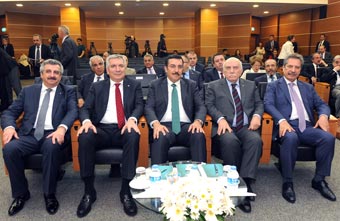
The Istanbul Chamber of Industry’s (ICI) ordinary monthly assembly meeting took place on April 27, Wednesday at Odakule, with the agenda “Significance and Impact of the New Production-Based Economy for Turkish Trade and Industry”. Bülent Tüfenkci, Turkish Minister of Customs and Trade, attended the April Meeting hosted by ICI Chairman of the Board of Directors Erdal Bahçıvan and moderated by ICI Vice President of Assembly Ismail Gülle. Minister Tüfenkci made remarks on current debates.
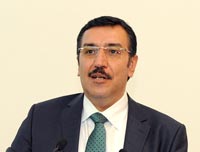
Bülent Tüfenkci, Minister of
Customs and Trade
Bülent Tüfenkci, Minister of Customs and Trade, announced an incentive package to protect Turkish industrialists against the challenges of international competition. Tüfenkci told that Türkiye’s export markets experienced a recession until recently, which made it necessary to look for new markets. As an exception to the ICI Assembly’s regular conduct, Minister Tüfenkci came to the Assembly Tribunal. Together with the ministerial bureaucrats, Minister Bülent Tüfenkci immediately and interactively responded to the Assembly Members’ questions and comments.
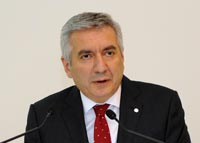
Erdal Bahçıvan, Chairman of
the Board of Directors, ICI
ICI Chairman Erdal Bahçıvan gave a speech on the Assembly’s agenda, stressing prolonged processes and increased costs due to the red line practice at customs: “A more selective approach to applying the red line to products will be more beneficial in terms of overcoming the problem,” he proposed. Bahçıvan also mentioned the suspension of bankruptcy cases, which have recently increased: “Suspension of bankruptcy should be subject to more realistic conditions. We need new regulations to protect creditors as well as companies experiencing genuine financial difficulties, while preventing potential misuses at the same time,” he said.
During the short speech he gave in the Assembly’s opening, Ismail Gülle, ICI Vice President of Assembly, highlighted the tremendous significance of industry for commerce and national economy. “More powerful industrialists will boost Türkiye’s power,” noted Gülle.

Ismail Gülle, ICI Vice
President of Assembly
“We are proud to take part in the manufacturing side of the economy. We are striving to improve whatever we do and produce, taking everything one step further. It is tremendously important for us to see that we are not alone in these efforts and that we feel the friendly support of the Turkish Ministry of Customs and Trade.”
ICI Chairman Erdal Bahçıvan made remarks on the agenda, drawing attention to prolonged processes and increased costs due to the red line practice applied to customs clearance procedures. According to Bahçıvan, an effective and responsive system of customs would enable Türkiye to reinforce its competitive power in foreign trade. He expressed how glad they were to see the Ministry of Customs and Trade’s efforts on this matter: “Particularly the ‘authorized economic operator’ (AEO) practice supports the past-performance system that we have always promoted to prevent the overload at the customs in the short-run. The industrialists will experience smoother customs processes if this practice gains popularity.”
More realistic conditions needed for suspension of bankruptcy
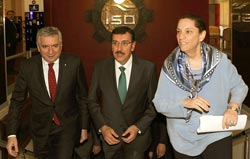
Bahçıvan also mentioned the problems experienced by industrialists regarding the letters of guarantee for the public sector and suspension of bankruptcy: “We experience the problem of the letters of guarantee under the Inward Processing Regime as well. Release of those guarantees takes a long time, which poses liquidity problems for Turkish companies. We recommend that the Ministry consider a credit insurance system as a solution. Also, numerous companies have recently referred to courts and received suspension of bankruptcy orders. In our opinion, suspension of bankruptcy conditions should be more realistic. We need new regulations to protect creditors as well as companies experiencing genuine financial difficulties, while preventing potential misuses at the same time.”
External vulnerabilities to affect banking industry
As part of his remarks on the economy, ICI Chairman Bahçıvan drew attention to Türkiye’s ongoing vulnerability to external shocks despite relative improvements including the booming domestic demand, industrial production growth observed in the first two months of the year, and the downward trend in monthly inflation rates.
Bahçıvan explained that a variety of major risks continued, including sudden capital outflows, diminishing international reserves and high exchange rate vulnerability of private sector balances. He said: “All those risks have the potential to affect the banking industry. Although Turkish banks are strong in terms of capital adequacy, we would like to stress that Basel III practices may limit the banks’ loan extension capacity to a certain extent in the near future, which may exacerbate the financial problems facing the real industry.”
Investment-based growth needed
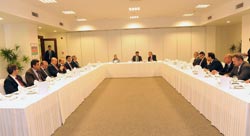
Bahçıvan told that it was still a priority to increase domestic savings and improve the investment-savings balance in order to mitigate external vulnerabilities. Türkiye needs an investment-based growth, Bahçıvan said, and continued: “Lastly, we have observed that in 2015, 15 percent of the investments, accounting for 20 percent of the national income, were made with domestic savings. We also have to take into consideration that, again in the same year, private domestic savings constituted only 10.4 percent of the national income, a historic low. We are heading towards a period of scarcer resources. It would benefit every party if the real sector and finance industry could successfully handle this rough patch with mutual understanding and trust, without giving into pessimism.”
Bülent Tüfenkci, Minister of Customs and Trade, took the floor following ICI Chairman Erdal Bahçıvan. He said that he has regarded the industrialists as heroes since his early years as a lawyer when he started to get acquainted with industrialists. Appreciating that industrialists both manufacture and market their products despite all difficulties and obstacles, Tüfenkci told that industrialists contributed to the national economy in spite of ruthless market conditions in Türkiye and abroad. Tüfenkci stressed that Türkiye owed its export and growth targets to the industrialists’ performance.
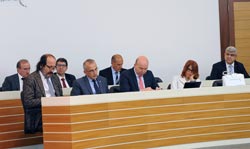
Tüfenkci mentioned the ongoing impact of the 2008 crisis that broke out due to the irrational practices in the global financial system, and that Türkiye continued to grow to the surprise of international markets despite this situation. He told that developing countries entered a period of economic slowdown as develop countries struggled with recession, emphasizing serious problems experienced by those economies depending on raw material and energy exports. “We relied on our people and business people throughout this process,” Tüfenkci said after referring to Türkiye’s significant achievements in that period of difficulties.
According to Tüfenkci, the meaningless bureaucratic obstacles faced by industrialists and manufacturers must be eliminated if Türkiye was to become an investible country. He also recommended that the problems leading to employee-employer conflicts be resolved as well. Employees’ rights must definitely be protected, said Tüfenkci, who also stressed that the courts should abandon the approach that condemned the employers from the start. Tüfenkçi: “It’s not your business to deal with the bureaucracy and courts. Instead, you should focus on manufacturing, thinking about markets to sell those products as well as marketing conditions.”
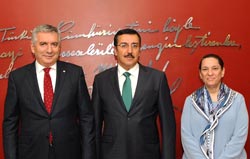
Tüfenkci mentioned the incentive packages that would soon be on the agenda. With this package, Turkish industrialists will diversify their production and manufacture products fit for new markets, he said. Tüfenkci told that Türkiye’s export markets experienced a recession until recently, which made it necessary to look for new markets. Tüfenkci also acknowledged Istanbul’s significance for the Turkish economy. He reported that the ICI members accounted for 34% of Turkish exports, emphasizing their powerful will to resolve the problems experienced by the industrialists who had such a great significance.
They aim to reduce the costs of business transactions, Tüfenkci said, and he expressed their intention to reduce the time and costs associated with incorporation and dissolution of companies. He promised to complete the single-window system as of June and gather the laboratories under a single structure so that importers and exporters would no longer run from pillar to post between laboratories.
He further announced a free logistic trade center to be established. These centers will follow a similar structure to their counterparts in Dubai or Singapore, which include warehouses and allow free trade of commodities on an international scale. He explained their plan to establish border trade centers at the southeastern provinces in order to contribute to the regional growth alongside the ongoing trade at the borders. Tüfenkci reported the red line rate of exports to be 5% and they aimed to reduce it to 3%. He stressed the Ministry of Customs and Trade’s duty to both facilitate and protect trade, which should be fulfilled.
They have resumed the AEO practice and they are willing to extend its reach, Tüfenkci told. Tüfenkci further announced that they have reconstructed the border gates to facilitate the customs procedures. They will demolish and reconstruct the Sarp border gate this summer, and then reconstruct Hamzabeyli, Kapıköy and Dereköy border gates.
Minister further mentioned the Single-Window system, thanks to which it will be possible to see which trucks will be subject to what kind of procedures at which customs gate. This will prevent abuses, Tüfenkci said. He told that the Single Point Project would allow all procedures to be carried out at a single point in order to minimize the waiting time.
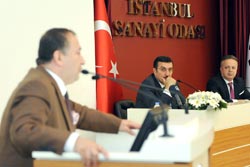
After Minister Tüfenkci’s speech, ICI Assembly Members took the floor to speak of the agenda. At that point, as an exception to the ICI Assembly’s regular conduct, Minister Tüfenkci came to the tribunal and sat next to ICI Vice President of Assembly Ismail Gülle in order to answer the Assembly Members’ questions instantly. Together with the ministerial bureaucrats, Minister directly and interactively responded to the Assembly Members’ questions and comments.